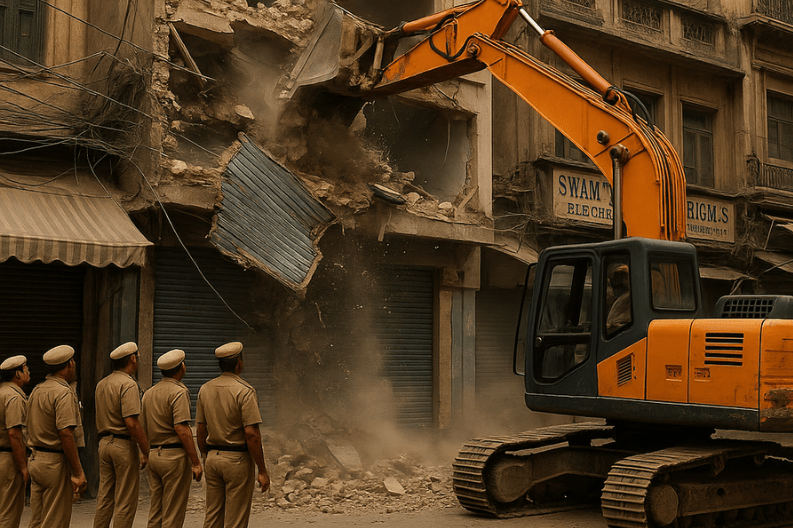The Supreme Court took a major step on Monday as the Court orders cleanup of unauthorized buildings in Chandni Chowk by December 31, 2025. The judges explained that this action will improve the city, restore order, and ensure everyone respects property laws.
A bench led by Justices Surya Kant and N Kotiswar Singh ended all stay orders from the high court and the Municipal Corporation of Delhi (MCD). For years, these orders protected illegal constructions from demolition. Now, those buildings must be removed, and the city must prepare for a large-scale cleanup effort.
The court also gave affected residents and shop owners a chance to raise their concerns. They can directly approach the Supreme Court if they believe their rights are at risk. At the same time, the judges instructed the municipal corporation to carry out demolitions responsibly. They also asked the Delhi Police to provide full support to maintain law and order during the process.
The ruling pointed out a long-standing issue. The appellate tribunal, which hears cases on unauthorized buildings, does not have a presiding officer. This delay has blocked appeals for months. The bench requested Chief Justice Devendra Kumar Upadhyaya to fill the position quickly so that the system can work smoothly.
The judges also expressed concern over property misuse. Many owners have converted residential buildings into commercial units without proper approval. This illegal shift disrupts city planning, increases strain on services, and creates unsafe living conditions.
Chandni Chowk, one of Delhi’s busiest and most historic markets, is home to narrow lanes, shops, and heritage sites. Its cultural value is immense, and the court emphasized the importance of keeping it clean, safe, and legally managed.
This order also reflects broader challenges in urban areas. In Punjab, unauthorized real estate projects confuse buyers and tenants. The government is trying to regulate these developments more effectively. Meanwhile, Chandigarh often ranks high in Swachh Survekshan surveys, proving that strict planning and discipline can bring success.
Mohali, part of the Chandigarh region, has also seen rapid urban growth. While progress creates jobs and opportunities, it also increases risks of illegal construction. The court’s ruling shows why consistent enforcement across growing cities is essential.
The Supreme Court made its message clear: no one is above the law. Builders, shop owners, and developers must follow the rules or face demolition and penalties. The December 2025 deadline signals both urgency and time for careful planning.
This cleanup will need teamwork. The MCD, Delhi Police, and other agencies must coordinate demolition work, protect nearby residents, and safeguard heritage sites. Public awareness campaigns may also help citizens understand the importance of following building rules.
The decision is not only about Chandni Chowk. It sets a model for other cities where unauthorized buildings disrupt urban life. Illegal construction weakens governance, threatens safety, and damages community trust.
In conclusion, the Supreme Court’s ruling where the Court orders cleanup of unauthorized buildings highlights the need for law, planning, and responsibility. With government action and citizen support, Chandni Chowk and other areas can remain safe, vibrant, and open for everyone.



